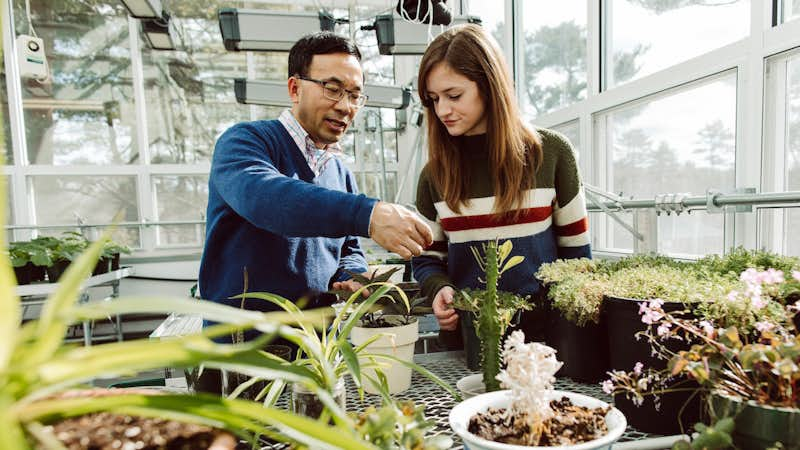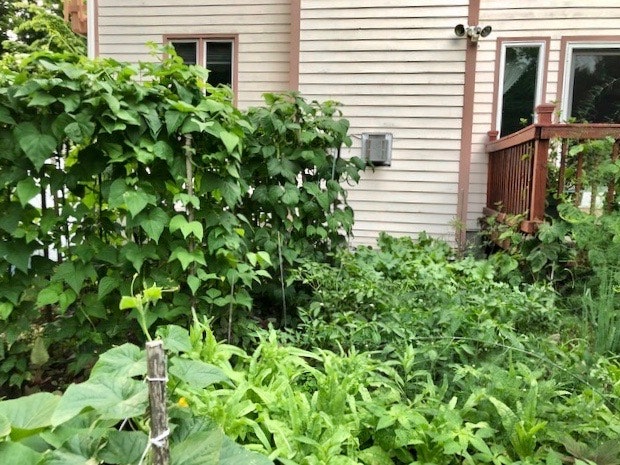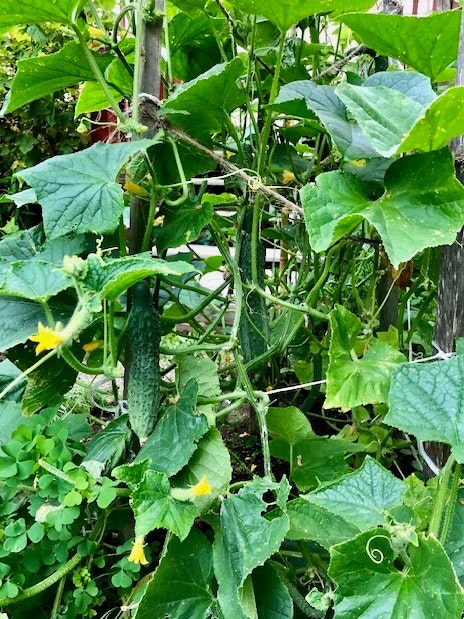Five Gardening Tips from Gordon’s Greenhouse Expert

Posted on August 17, 2020 by College Communications in Faculty, Featured.

Just a few miles down the road from Gordon in South Hamilton, MA, Dr. Ming Zheng’s backyard garden brims with cucumbers, colorful peppers, kale, Japanese squash, Chinese stem lettuce and string beans. The lush display is exactly what you’d expect from a plant expert and professor of biology.
During the recent season of social distancing, many have turned to gardening as an escape from the indoors (or bringing the outdoors inside), an alternative to grocery shopping, a break from pesticides and a source of peaceful routine. As Zheng watches sprouts break through the soil and blossom both at home and in Gordon’s greenhouse, he meditates on God’s creation. “The closeness with nature, watching plants grow and get bigger and produce seeds . . . It's therapeutic,” he says.
This form of therapy can be practiced by anyone with a windowsill and a faucet. Here are some tips from Zheng that will help your indoor or outdoor gardens thrive.
A garden doesn’t need to be perfect. “If you're looking for a perfect, picturesque, spotless garden, you’ll be disappointed,” Zheng says. Before aesthetics come into play, the trial and error of determining which soil to use and where to grow each plant is a messy process—and that’s okay.
Know your land. Ask yourself questions about water, soil and fertilizer, soil aeration, sunlight and climate: How much sunlight does my land get? What type of climate do I live in? What is the soil like? Is the land constantly saturated with water? The U.S. Department of Agriculture offers a National Agricultural Library with plenty of tools to help answer these questions.
“You just need to try to adapt to that and figure out the best way to make the use of your plot, just the way it is,” says Zheng. And if your land isn’t quite suitable for growing, check out a resource like YardYum find out where you can rent a plot in a more conducive environment.

Work with nature, not against it. As much as you may want to grow avocados in New England, ginger in the southwest, or Brussels sprouts in the southern sunshine, growing a plant outside of its ideal climate won’t yield good results. Zheng recommends only growing what is best adopted to your environment—here in New England’s cool, short growing season, he personally opts for peppers, kale and bitter melons.
But if you’re really set on growing that ginger, Zheng recommends finding a variation of the plant that will better acclimate to your environment. In order to grow luffa, he began purchasing luffa gourd seeds from northeastern China where the weather is similar to New England, rather than purchasing from subtropical environments.
Start small. From humble beginnings with tomatoes and cucumbers to a whole summer’s worth of produce—raspberries, mint, string beans and luffa gourds—Zheng expanded his garden over five years as his knowledge and experience grew. Like Zheng, begin with plants that require minimum attention like cucumbers, tomatoes, squash, zucchini, lettuce and spinach. Once you’ve mastered the basics, you’ll feel more confident growing produce that require involvement like beans and more exotic plants.
“If your heart is in it, you're going to figure it out pretty quickly,” he says.
And if all else fails or you don’t have access to outdoor space, try some houseplants. If you’re still unsure of where to begin, Zheng says houseplants are a great starting point. Indoors, he recommends jasmine, red pearl, gardenia, aloe vera and other succulents—they are low maintenance, improve indoor air quality and are a nice way to spruce up your space.
Most houseplants only require about six hours of sunlight each day, says Zheng, though not all succulents are the same—they require different amounts of sunlight, soil and air quality. So before purchasing a plant, do some research to make sure it will adapt well to your space.
Happy growing!
By Ellian Chalfant ’22, communication arts and Spanish
Share
- Share on Facebook
- Share on X (Formerly Twitter)
- Share on LinkedIn
- Share on Email
-
Copy Link
-
Share Link
Categories
Archives
- March 2026
- February 2026
- January 2026
- December 2025
- November 2025
- October 2025
- September 2025
- August 2025
- July 2025
- June 2025
- May 2025
- April 2025
- March 2025
- February 2025
- January 2025
- December 2024
- November 2024
- October 2024
- September 2024
- August 2024
- July 2024
- June 2024
- May 2024
- April 2024
- March 2024
- February 2024
- January 2024
- December 2023
- November 2023
- October 2023
- September 2023
- August 2023
- July 2023
- June 2023
- May 2023
- April 2023
- March 2023
- February 2023
- January 2023
- December 2022
- November 2022
- October 2022
- September 2022
- August 2022
- July 2022
- June 2022
- May 2022
- April 2022
- March 2022
- February 2022
- January 2022
- December 2021
- November 2021
- October 2021
- September 2021
- August 2021
- July 2021
- June 2021
- May 2021
- April 2021
- March 2021
- February 2021
- January 2021
- December 2020
- November 2020
- October 2020
- September 2020
- August 2020
- July 2020
- June 2020
- May 2020
- April 2020
- March 2020
- February 2020
- January 2020
- December 2019
- November 2019
- October 2019
- September 2019
- August 2019
- July 2019
- June 2019
- May 2019
- April 2019
- March 2019
- February 2019
- January 2019
- December 2018
- November 2018
- October 2018
- September 2018
- August 2018
- July 2018
- June 2018
- May 2018
- April 2018
- March 2018
- February 2018
- January 2018
- December 2017
- November 2017
- October 2017
- September 2017
- August 2017
- July 2017
- June 2017
- May 2017
- April 2017
- March 2017
- February 2017
- January 2017
- December 2016
- November 2016
- October 2016
- September 2016
- August 2016
- July 2016
- June 2016
- May 2016
- April 2016
- March 2016
- February 2016
- January 2016
- December 2015
- November 2015
- October 2015
- September 2015
- August 2015
- July 2015
- June 2015
- May 2015
- April 2015
- March 2015
- February 2015
- January 2015
- December 2014
- November 2014
- October 2014
- September 2014
- August 2014
- July 2014
- June 2014
- May 2014
- April 2014
- March 2014
- February 2014
- January 2014